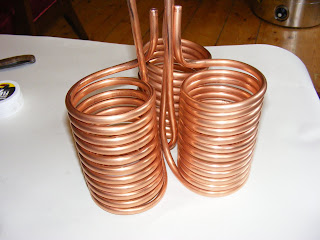I'd like to point out straight away that I agree with them -- HSBD is misconceived and does more to hobble the burgeoning brewing culture in the UK than it can ever hope to do with problem drinking.
However, I do think that in order to argue effectively against HSBD, we need to be careful to get our facts straight. The things I'm about to point out may seem trivial (and in the ongoing fight against increasing taxation and the anti-alcohol health lobby, they are), but every factual error that is perpetuated by proponents of beer is a sticking point the "other side" can spend precious time pointing at, claiming that the public are being misled, and generally discrediting those who repeat them.
Myth #1: Beers of 7.5% are subject to HSBD
This one's the most prevalent, and it's understandable that it's become the commonly accepted as until a few weeks ago there was no information available on whether 7.5% would be in the higher or lower bracket; it's standard practice for upper limits to be described as "not exceeding X%" and lower limits to be delineated as "exceeding X%", though, so those in the know should have been able to better predict the starting point.
To be absolutely clear : HSBD applies to beers of 7.6% and above.
Myth #2: Beers of 9% pay as much duty as wine at 15%
This simply isn't true. I'm not sure where it started, but I've seen it repeated far and wide.
Wine exceeding 5.5% and not exceeding 15% pays duty at £241.23 per hectolitre of product.
Beer exceeding 7.5% pays duty at £23.21 per hectolitre per cent of alcohol.
What's immediately obvious is that duty on wine and beer works quite differently : wine pays a flat rate based on volume, with categories defined by strength, while beer pays a rate directionally proportional to strength. (Spirits pay duty in the same way as beer, but expressed in a different way. Such are the mysterious ways of HMRC).
Now, to find the point at which beer pays more duty than wine, we need to do a little maths. The equation to determine how much duty is payable on a volume of beer is:
Duty Payable = Volume x ABV x RateNow, if we plug in the numbers for 1 hectolitre of wine and rearrange the equation, through the magic of algebra we find that beer does not overtake wine of 15% until the beer exceeds 10.3% ABV (ie beers of 10.4% and above are more expensive duty-wise than wines of 15%).
However, breweries eligible for small brewers relief only pay half the basic rate, and so while they pay the full amount of HSBD (for a total rate of £13.93 per hectolitre per cent of alcohol), they don't pay more duty than 15% wine except on beer of 17.4% or greater, and 17.4% wine pays a higher rate again.
What renders this argument even more open to criticism is that it focusses on one end of the scale -- while a brewer pays about the same duty on his 10.3% triple imperial stout as a vintner does on his 15% Merlot, the vintner pays the same rate on his 5.6% made wine.
 |
| A handy graph |
As can be seen from the graph, small brewers pay less than vintners (for the same volume of product) all the way up to 22%*
The reason I think it's important that we (ie those who oppose HSBD) stop using this argument is that it's terribly weak. It could just as easily be turned on its head and be used as an argument for lower duty for wine at 5.6% (or even higher duty for beer at that level). There is no worse enemy than an ally who makes bad arguments.
 |
| Rearranged for direct comparison |
What next?
We're all on the same side; none of us like the High Strength Beer Duty, but it doesn't serve any of us to get the facts wrong. I disagree with CAMRGB on a fundamental and daily basis, but one thing they've got right is the e-petition against the "October beer tax" as he terms it.
If you haven't already, go and sign it. It'll take two minutes and it might just make a difference.
*The graph stops there as wine pays spirit duty above 22%, and the HMRC website is contradictory on the subject of beers of that strength. Some pages say it too pays spirit duty, while the main page on beer duty is silent on the matter.













